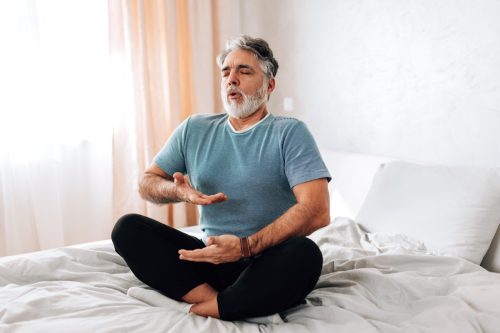10 Science-Backed Ways to Calm Down Fast

Our bodies can change when we’re stressed out. You’ll likely notice that you’re starting to sweat more, and your muscles may be tensing up. At the same time, your heart rate, breathing, and blood pressure will usually rise as well. All of these are signs of the “fight-or-flight” response we tend to experience as a result of stress, according to the National Institutes of Health (NIH). But if this type of physical reaction is common for you, it could have negative effects on your health.
“Long-term stress (also called chronic stress) may contribute to or worsen a range of health problems including digestive disorders, headaches, sleep disorders, and other symptoms,” the NIH cautions. “Stress may worsen asthma and has been linked to depression, anxiety, and other mental illnesses.”
The agency conducts its annual National Stress Awareness Month every April to highlight how managing stress can minimize its negative health impact. Of course, this is often easier said than done—but research shows there are several relaxation techniques that have been proven to help you out at a moment’s notice. Read on to discover 10 science-backed ways to calm down fast.
RELATED: The 6 Best Meditation Styles for Relieving Stress If You’re Over 50.
1
Tap your fingers.

While activities like yoga are well known for helping people to relax, it’s not always convenient for us to take a break from what we’re doing and get into a downward dog pose.
That’s why a technique called “tapping” can be helpful; you can do it on your own almost anywhere by using your fingertips to tap on specific areas of your body.
“Sometimes described as ‘acupuncture without needles,’ Emotional Freedom Technique (EFT) helps those who practice it move stagnant energy throughout the body by tapping on acupressure points, and is done in combination with reciting phrases that shift anxious emotions to more calming thoughts [and activating] the parasympathetic nervous system, which is key to relaxation,” Bridget Botelho, certified Integrative Health Practitioner (IHP) and founder of Immune Intuition, tells Best Life.
2
Turn on the “world’s most relaxing song.”

Turning on the right song can also take down your stress levels. In 2011, neuroscientists from Mindlab International teamed up with sound therapists from the British Academy of Sound Therapy to determine the relaxation effects of several different tracks.
They determined that listening to a song called “Weightless,” which was crafted by the band Marconi Union with the help of British Academy of Sound Therapy founder Lyz Cooper, proved to be more relaxing for participants overall than getting a massage or listening to other relaxing songs.
Dubbed the “world’s most relaxing song,” this track was able to reduce participants overall anxiety by 65 percent and lowered their usual resting heart rate by 35 percent, David Lewis-Hodgson, BsC, neuropsychologist and chairman of Mindlab International, told Inc.
‘Weightless’ was so effective, many women became drowsy and I would advise against driving while listening to the song because it could be dangerous,” Lewis-Hodgson told the magazine.
RELATED: 15 Songs That Will Instantly Boost Your Mood.
3
Or listen to “binaural beats.”

Not in the mood for music? Try listening to binaural beats instead. This “is a type of sound therapy in which the listener hears two slightly different audio frequencies, which creates an auditory illusion and sensing of a frequency that may have a relaxing effect,” Botelho explains.
Binaural beats are believed to induce the same mental state that is associated with a meditation practice, but in a much quicker way, according to Healthline. As a result, they may help people relax, decrease their stress and anxiety, and manage their pain.
“The research is definitely mixed on the usage of binaural beats, but I find it worth mentioning for anyone who is interested in exploring different types of music that could help create a sense of calm,” Botelho says. “I personally find binaural beats to be very relaxing, like music you would find at a spa. And who doesn’t love that?”
4
Make time to read for a few minutes.

No one’s asking you to read an entire book in one sitting. But Lewis-Hodsgon previously conducted another study at the University of Sussex’s Mindlab in 2009 and discovered that doing this one activity for even a short amount of time can help you calm down, The Daily Telegraph reported. According to his research, reading silently for just six minutes reduces stress levels by 68 percent.
“Losing yourself in a book is the ultimate relaxation,” Lewis-Hodsgon told the newspaper. “It really doesn’t matter what book you read, by losing yourself in a thoroughly engrossing book you can escape from the worries and stresses of the everyday world and spend a while exploring the domain of the author’s imagination.”
5
Say cheese.

Hear us out: This isn’t about plastering on a fake smile and pretending everything is OK—it’s about plastering on a fake smile and actually feeling better.
Part of a technique practiced in dialectical behavior therapy (DBT), forcing yourself to smile sends a calming message to your brain.
“When you smile, your brain releases tiny molecules called neuropeptides to help fight off stress,” the experts at SCL Health explain, noting that this will activate other neurotransmitters like dopamine, serotonin, and endorphins. “The endorphins act as a mild pain reliever, whereas the serotonin is an antidepressant.”
RELATED: 7 Simple Things You Can Do Right Now to Turn a Bad Mood Around.
6
Grab some gum.

Chewing gum has been proven to help you calm down too. A 2008 study found that levels of salivary cortisol—which is a physiological marker of stress—in gum-chewers were 16 percent lower during mild stress, and nearly 12 percent lower during moderate stress when compared to non-gum chewers.
The researchers also determined that participants reported lower levels of anxiety and increased alertness during self-reported stress when they were chewing gum.
7
Get around some animals.

Sure, furry friends are fun to have around. But they’re also quite helpful when it comes to alleviating your stress. In 2019, scientists at Washington State University (WSU) were able to prove that spending even a short amount of time petting cats or dogs can have stress-relieving physiological benefits.
“Just 10 minutes can have a significant impact,” Patricia Pendry, associate professor in WSU’s Department of Human Development who helped publish these findings, said in a statement. “Students in our study that interacted with cats and dogs had a significant reduction in cortisol.”
8
Try breathing techniques.

OK, you were breathing anyway. But why not try breathing in a specific way that’s been shown to reduce stress?
A 2017 study published in the Frontiers in Psychology journal found that deliberate deep breathing exercises, also known as diaphragmatic breathing, were able to lower cortisol levels.
There are lots of different breathing exercises that can help you calm down, including a simple technique called box breathing. Melissa Young, MD, told the Cleveland Clinic that box breathing is easy to learn and to remember.
“Box breathing’s simplicity is its greatest strength,” she said. “When you start out with other forms of breath-work, you can almost get more anxious by overthinking it. But this is just very simple breathing and counting.”
Want to try it? Just exhale slowly until your lungs are completely empty. Then breathe in for a slow count of four, hold for four beats, breathe out for a count of four, hold for four, breathe in for four—and repeat the cycle several times, until you begin to feel better.
RELATED: 7 Effective Ways to Control Your Anxiety, According to Therapists.
9
Go outside.

A simple change in your environment can show you that the grass is greener on the other side. A 2019 study published in the journal Frontiers in Psychology found that spending just 20 minutes connecting with nature can help lower levels of the stress hormone cortisol.
You don’t even have to do anything while you’re outside either, according to the research. While some of the participants opted to go for a walk, others simply sat in an outdoor space and were still able to experience nature’s calming effects.
10
Create a routine.

While there are so many practices that can help reduce stress, Botelho advises people not to “overlook the power of creating a solid and supportive daily routine.”
This approach requires more preparation than, say, forcing yourself to smile during a stressful time. But creating a structure and schedule for your daily life might be worth your while.
“I work with clients to create a routine and flow to their day and throughout their week, which can help the body feel stable and limit overwhelm,” Botelho explains.
Her best tip for starting and implementing a routine?
“Work toward having a consistent bedtime and wake-up time, and incorporate a 10 to 20-minute morning walk outside to set your body’s circadian clock for the day,” she says. “Also be mindful of blue-light exposure, and limit screen time one to two hours before bed.”
Best Life offers the most up-to-date information from top experts, new research, and health agencies, but our content is not meant to be a substitute for professional guidance. When it comes to the medication you’re taking or any other health questions you have, always consult your healthcare provider directly.
- Source: NIH: Stress
- Source: NIH: National Stress Awareness Month
- Source: AERA Open: Animal Visitation Program (AVP) Reduces Cortisol Levels of University Students: A Randomized Controlled Trial
- Source: Frontiers in Psychology: The Effect of Diaphragmatic Breathing on Attention, Negative Affect and Stress in Healthy Adults
- Source: Cleveland Clinic: How Box Breathing Can Help You Destress
- Source: Frontiers in Psychology: Urban Nature Experiences Reduce Stress in the Context of Daily Life Based on Salivary Biomarkers